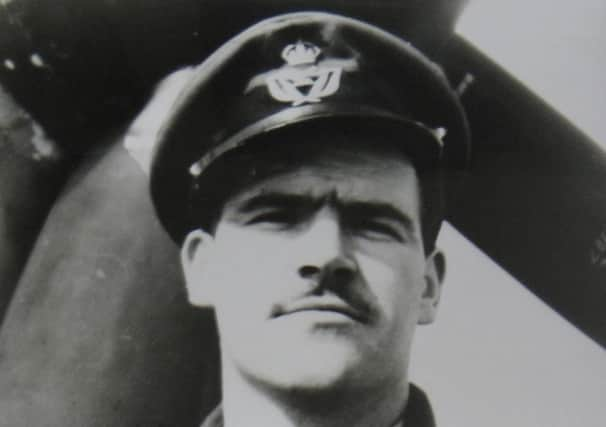Obituary: Warrant Officer Alex Walker


ALEX Walker, who has died aged 93, was a farm boy from Islay who joined the RAF and served with distinction in the Second World War, flying Spitfires as a photographic reconnaissance pilot.
Walker, whose aircraft had its cannon removed and a high-resolution camera fitted, flew at extreme altitudes to locate targets and capture images of enemy positions.
Advertisement
Hide AdAdvertisement
Hide AdHe gathered crucial intelligence for the Allies as they pushed Axis forces north through Italy from 1944-45, surviving 53 sorties in the process.
Pilots had to maintain radio silence in a cramped cockpit on missions lasting up to seven hours. The role relied on high speed and high altitude to avoid detection, and weather was often the biggest enemy.
Walker passed out from oxygen starvation on one flight but recovered in time to save his life. Another sortie saw his plane so mangled by giant hailstones that it was scrapped after he landed.
The son of a painter and decorator, Alexander Walker was born on the island of Islay. His family moved to the mainland to escape the Depression, settling first in Govan, Glasgow, then Waterside in Ayrshire.
He left school at 14 and worked in a creamery before joining the RAF, on the basis that the queue for the Royal Navy, his first choice, was far too long.
Walker had little more than a farm boy’s education, but he scored excellent marks in his aptitude tests and was selected for pilot training.
He was gifted with airmanship skills and was made a flying instructor directly after completing his own training at Scone in Perthshire.
Walker was teaching a trainee the “falling leaf” manoeuvre in a Tiger Moth biplane when the aircraft stalled and dived.
Advertisement
Hide AdAdvertisement
Hide AdIt ended upside down, stripped of its wings with the petrified trainee hanging from his straps. “We’ll concoct a story,” Walker reassured him as he cut him free.
As a Spitfire pilot flying alone, he had to become an excellent navigator and usually relied on dead reckoning to maintain a precise course and altitude.
He was based in North Africa and Italy and took part in missions over Italy, Sicily, Sardinia, Crete, Athens and the Aegean islands. On one night sortie, he was the only one of more than 12 pilots to return.
One mission with 683 Squadron in Italy in January 1945 prompted him to write in his log book: “Climbed through cloud from 4,000ft to 23,000ft. After breaking cloud, passed out and woke up at about 5,000ft.
“Returning later, found aircraft wings corrugated, fuselage twisted and drop tanks blown to bits. Spent four days in hospital.”
Seven months later, he wrote: “Ran into large cumulus cloud near Ancona. Never had such a scare before. Canopy was smashed in by large hailstones and all five rads flattened.
“Spinner, wings and tail looked as though they had been done over with a 14lb hammer. Aircraft dismantled by 110 Maintenance Unit.”
Walker also flew with 237 (Rhodesian) Squadron and taught the country’s future leader, Ian Smith, how to fly. Years later, he reflected: “He didn’t seem the man he turned out to be.”
Advertisement
Hide AdAdvertisement
Hide AdIn the country’s capital, Salisbury – now Harare – he saw two white police officers beating an African man. Incensed at the injustice, he went to the victim’s aid and received several injuries.
This action was typical of Walker, nicknamed “The Wire” thanks to his toughness. At the age of 50, he ended up in court having been charged with assaulting three ex-colleagues, who were arrested themselves – but all three opponents had suffered obvious injuries. After hearing that Walker had been intimidated by the gang, 30 years younger than him, and had taken matters into his own hands, the stipendary magistrate had no hesitation in releasing him with an admonishment.
A colourful and sociable man, during the war he had a narrow escape in Cairo in an incident involving a borrowed officer’s uniform (Walker was a warrant officer), a nightclub hostess, a raid by military police and the theft of an army jeep.
Following demobilisation he took a job at an engineering works in Glasgow before moving to Wallace and Co lace finishers in Newton Mearns, living in a post-war prefab house nearby.
Later, he worked for Dalmarnock Timber and Plywood in Glasgow and became a roads department manager for Strathclyde Regional Council, retiring aged 65. He then began a lengthy relationship with Sudoku.
For his 80th birthday, his family booked Mr Walker a flight in a familiar aircraft – a vintage Tiger Moth. Once airborne, he took over the controls from the instructor and carried out a “touch and go” manoeuvre before landing the plane himself.
Mr Walker, who was predeceased by his wife Mary, is survived by their son Robert and grandson Paul.
Jack Burgess, of the Scottish Saltire Aircrew Association, said: “Alex was a very popular member of our Glasgow Flight and we all miss his company very much.”